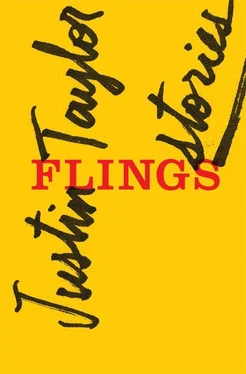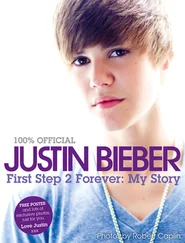When he turns his phone back on, he learns that Ellen called him sixteen times in the first two days he was gone. Her initial messages are desperate and imploring—“Baby, whatever I did wrong…”; “Baby, I don’t understand”; “Baby, TALK TO ME”—but that tone is soon supplanted by frustration, then rage. “You pussy!” she screams in one of them. He has never heard her speak this word before, and it pops in his ear like a cold wet finger, sending gooseflesh up his arms and a shiver through his loins. Scott has been at the hotel for a week.
There are also livid messages from his parents, who say that if they don’t hear from him within twenty-four hours they will cancel the credit card and hire a private detective. (Empty threats since he hasn’t lost the room.) Danny, a college friend who also lives in Portland, sent this text: “You fucking moron, how is she supposed to do anything without a fucking car?”
Scott feels bad about the car. He had thought about it only in terms of ownership, and in doing so failed to consider the question of use. The house that he and Ellen sublet is in a suburb a half hour’s drive from her office, from all the good bars, from anywhere she might actually want to be in Portland. He writes back to Danny, “Shit im sorry do u think i should send her $ for a rental?” Danny’s reply comes faster than Scott would have guessed it was possible to type on a touch-screen keypad: “FUCK YOU DON’T EVER EVEN THINK HER NAME EVER AGAIN YOU FUCK.”
On the phone, he prevails upon Priscilla to sort things out with their folks. She’s his ambassador to the family and seems to enjoy the role. She tells him that she and their mother, appalled, have been in touch with Ellen. Their father has been heard to question Scott’s honor. “Remind them that Ellen wasn’t Jewish,” he says to her, wishing he could evict the hint of whine from his voice. He’s sitting on the room’s windowsill, cigarette on his lip, staring blankly at the office building across the street, itself essentially a blank.
“Believe me, little brother,” Priscilla says, “Mom and Dad have never needed to be reminded of that.”
Scott takes a daily walk through Chinatown. It gets him out of his room for an hour, ensures that he sees the sun — when there is sun to be seen in San Francisco — and keeps him from ordering the same ham-and-Swiss from room service three times a day. In Portsmouth Square Plaza, old men play Chinese chess on stone benches while the wind whips crazily and vagrants pull deposit bottles out of the trash. In the open-faced souvenir shops that line the steep streets there are countless jade or wood statuettes of Hotei Buddha, fat and laughing, and sweaters, sweatshirts, hoodies, and hats in every color of the rayon rainbow, all emblazoned with a Golden Gate Bridge. Scott remembers once having been told that the bridge never stops being painted. They start at one end, and it takes the whole year to get to the other, by which time the old work has absorbed so much dirt and damage that it needs to be redone, and so they begin again.
Sometimes he has lunch at this Japanese place where there is a moat built into the sushi bar. Little blue boats putter along in three inches of water, each tied to the next with shoelace rigging, like parading elephants twined trunk to tail. There was a place like this in Portland, but instead of boats it was an electric train set.
Scott orders iced watermelon juice and starts grabbing at the plastic plates that rest on the boats, on which pieces of sushi are grouped in twos and threes. A laminated placemat explains that the pattern of the plate indicates its price. When he’s finished eating, a waiter will tally up the plates and give him a bill. He has to be careful when reaching for the plates so that he doesn’t bump a boat and send water sloshing up onto it, or else knock the food overboard. The placemat concludes with this terse warning: SINK SAME AS EAT YOU PAY.
Scott never makes it to LA. He takes some money out of his trust to cover first, last, and security on an apartment in the Mission, plus furniture and whatever else he needs: towels, rugs, a bed. He goes on a few dates with a cute barista named Olivia. She has this staggering Afro that she keeps kerchiefed down while she’s at work. Scott tells his sister all about her, keeping only two facts from his account: first, that they are not a serious couple; second, that while Olivia is half black she is also half Jewish. On her mother’s side, no less. Olivia wasn’t bat mitzvahed, but she spits fire if she sees a FREE PALESTINE patch on a backpack. She wants to take one of those birthright trips to Israel to explore her roots. She encourages Scott to take one, too, but stops short of suggesting that they go together. Scott makes his sister understand that Olivia is the first significant girl after Ellen, and so Priscilla tells their mother, and now it’s a family scandal. These poor narrow-minded, well-meaning Long Island racists! All this tribal madness about bloodlines, purity — obsessions that have never worked out especially well for Jews. Unless you count the six thousand years of survival (that’s what Olivia would say), but then what about, for example, Tay-Sachs? Anyway, he calls home more often. The perplexed suffering in his mother’s voice is not unwelcome. He’s pretty sure “schvartzeh” is the only Yiddish word his father knows.
On a walk through his new neighborhood, Scott sees a homemade flyer stapled to a utility pole: I FOUND YOUR DOG. There’s a photograph of a blond mutt relaxing, stretched out on the floor with its muzzle on its front paws. It looks to be part retriever. Scott takes the flyer down and puts it in his pocket. He calls the number and receives an address, which he plugs into the maps app on his phone. Ten minutes south on the 101 and he’s in a part of the city that he’s never seen before, a miserable-looking neighborhood below McLaren Park that his phone says is called Sunnydale. The directions lead him to a gravel lot where there are two boxcars.
The boxcars’ open doors face each other, and a sun-bleached tarp is secured over the space between them, as an awning; white plastic chairs and a card table suggest a porch. A man with a white beard halfway down his gut and white hair all the way down his back emerges from one car, leaning on a hand-carved walking stick. “You must be who called,” the overgrown gnome says.
The boxcars are wired for electricity. The man has three computers going at once. Two of them mine bitcoins, he says, while the third donates its processing power to SETI. “Also grow,” he says, gesturing with his stave in the direction of the other boxcar. “Real good shit, if you’re interested. Medical grade.” The blond dog wanders out from a shadow and comes up to Scott for a sniff. Scott gets down on his knees and opens his arms wide, wondering what the dog will do. It licks his face, so he hugs it. “Found her wandering loose on Dolores,” the man says, supplying the story Scott hadn’t thought to ask for. “While I was on an, ahem, errand. Hope I didn’t cause you too much trouble taking her back here, but I couldn’t see leaving her.” Scott produces a bank-crisp hundred-dollar bill from his shirt pocket. The man shakes his head at the money but then takes it anyway. He pounds the ground with his walking stick. “I got a real big heart,” he says. “Big enough to burst.”
Scott names the dog Yreka. Whenever he walks her, he’s on his guard. What if he runs into her original owners? What if they call out to her and she bolts? The dog was found without a collar, and she’s put on a healthy amount of weight since Scott brought her home, so the odds are that she was abandoned or neglected. Nonetheless, he can’t shake the feeling that he has kidnapped Yreka rather than adopted her, and that somewhere in San Francisco is a person or a couple or a family who miss their dog. They probably live in his neighborhood. Almost every day, he walks by the utility pole where he saw the flyer, and he imagines her owners as a couple, approximately his own age, married a year and a half but childless — like his sister and her husband, they’re taking things slow. Before losing her, perhaps they joked that the dog was their trial-run baby. They probably don’t make that joke anymore.
Читать дальше












